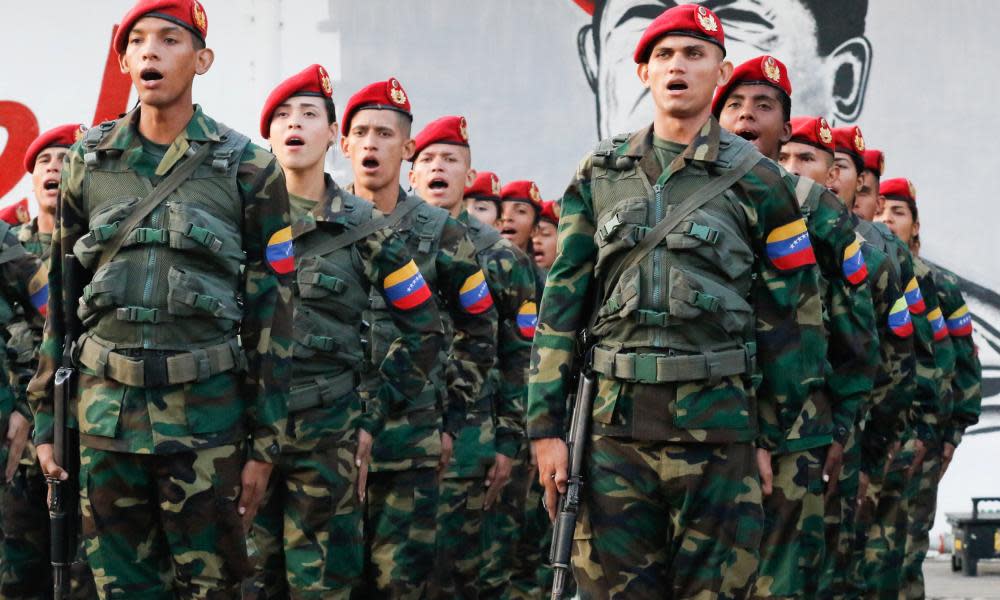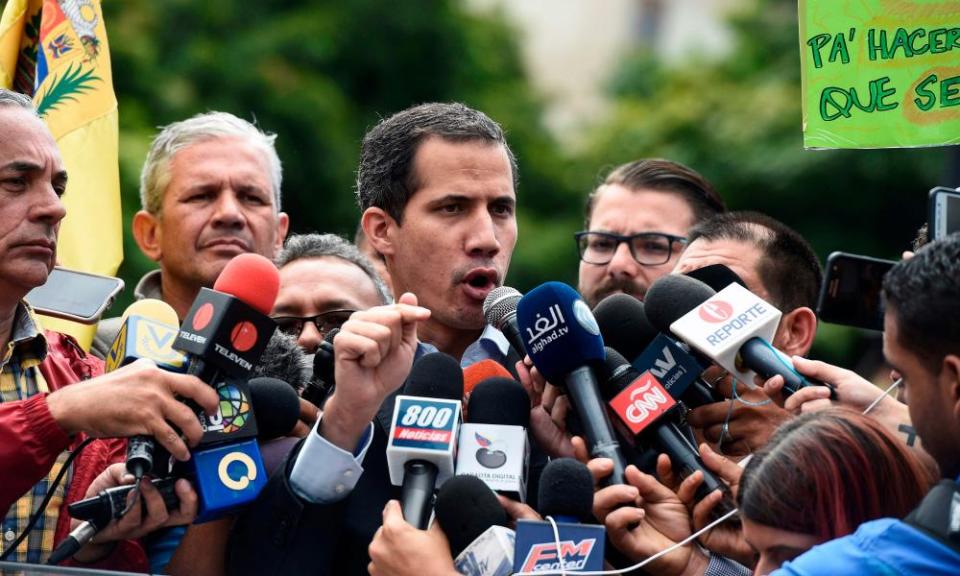'They will torture you': ex-Venezuelan soldiers on the risk of defecting

A month ago, Harry Solano was a sergeant in Venezuela’s national guard. Now he is an exile who meets members of the opposition in hotels across the Colombian border, always scanning the room to see who might be listening.
Solano was part of a dissident group within the armed forces that staged an uprising at a national guard post in Cotiza, a Caracas suburb last month. They aimed to reach the Miraflores presidential palace and force embattled President Nicolás Maduro out of office.
People took to the streets in support, and violent clashes with police carried on for days, but their attempt ultimately failed. Two dozen plotters were swiftly arrested, and countless others have not been seen since that night. Maduro had sent a clear warning to other would-be dissidents: he may be weakened but for now he still commanded the levers of power in Caracas.
“The normal soldiers, people like me, suffer the same as everyone else,” says Solano. “It is fear that keeps lower ranks [of the military] in line. Fear created by the knowledge that if you speak out publicly, they will torture and kill you and your family.”
Cúcuta, the Colombian border city where he is hiding out, has become infiltrated with spies, Solano says, accusing a man who hails him as a friend as one of them. Military defectors are of particular interest to both sides in the power struggle currently setting Venezuela on edge.
Juan Guaidó, the opposition leader and self-declared interim president, commands the backing of the US and dozens of other countries, but he has not been able to persuade the military to defect in numbers significant enough to shift the balance of power.
Maduro and his late predecessor, Hugo Chávez, won their senior officers’ loyalty by rewarding them lavishly for their service, promoting over a thousand to the rank of general, handing out lucrative positions at PDVSA, the state oil company, and allegedly turning a blind eye to involvement in drug trafficking, illegal mining and extortion.
Guaidó and his his allies are trying to whittle away at this support with Saturday’s planned controversial delivery of humanitarian aid sent by the US. They are also trying to sideline those generals by tapping into discontent among rank and file soldiers.
He aims to force these soldiers’ hand by offering them a hard choice: follow their orders and deny fellow Venezuelans much-needed food and medicines, or disobey Maduro publicly. But Solano knows first-hand what it means to go up against Maduro.

Solano alleges that his niece was raped and tortured by DCGIM, a military intelligence wing, when it became aware of his involvement in last month’s uprising.
He had already begun the complicated journey to Colombia, but his house was ransacked, and other members of his family were detained. A side business, a small shop below his Caracas home, was sacked.
“They [the authorities] are a mafia who control people only with violence,” Solano said. “They already know the people in their hearts are with Guaidó so they have to resort to barbarism.”
A slew of defections have already taken place, but mostly among officers safely beyond Maduro’s reach. His defence attache to the embassy in Washington announced his support for Guaidó last month, and a handful of other generals have switched sides. On Thursday, a former spy chief also threw his weight behind the young opposition leader.
The mass military exodus so many were hoping for has yet to materialise however, and not for a lack of trying. In late January, Guaidó canvassed military bases across the country, promising soldiers in a letter distributed to officers that they would be given amnesty if they “contribute to the reestablishment of democratic order”.
It is an effort bolstered by international pressure, with the Trump administration – Guaidó’s most prominent backer – calling on the military to allow aid into the country and side with their man.
“You will find no safe harbour, no easy exit and no way out. You will lose everything,” Donald Trump said in a speech at Florida International University in Miami on Monday before large US and Venezuelan flags. “We seek a peaceful transition of power, but all options are open,” he added, reviving fears that a military intervention could be on the cards.
Raúl Daniel Alvarenga was a sergeant major in the Venezuelan army, serving from 1997 until 2013, when he resigned in protest and fled the country.
“My escape to Colombia was like a movie,” he says, detailing a journey that involved dodging the police and sleeping in homeless shelters. “It’s naive to think people will just switch sides in the face of such intimidation.”
Six years later, Alvarenga says he still lives on edge, keeping his intelligence and special operative skills honed. “I’m always ready,” he says. “Lamentably, in Venezuela if they catch you, they will torture you physically and psychologically.”

 Yahoo News
Yahoo News 